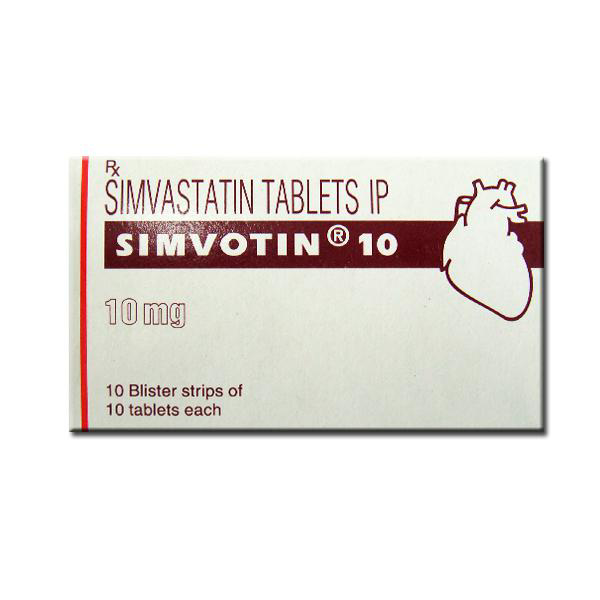SIMVOTIN 10mg Tablet
$13.00 $10.00
SIMVOTIN 10mg Tablet

Description
Simvotin 10 Tablet is usually taken in the evening, either with or without food. However, taking it with food may reduce the chances of nausea. Take it regularly for maximum benefit. Most people with high cholesterol do not feel ill, but stopping your medicine may increase your cholesterol levels, making your condition worse and increasing your risk of heart disease and stroke.
It is important to have your cholesterol levels checked regularly. This medicine is only one part of the treatment program which should also include a healthy diet, regular exercise, smoking cessation, moderation of alcohol intake, and weight reduction. You can eat normally while taking this medicine, but try to avoid foods that are high in fat.
Common side effects of Simvotin 10 Tablet include upper respiratory infections, headache, abdominal pain, constipation, and nausea. These are usually mild and temporary. Consult your doctor if they persist. Inform your doctor or if you notice any yellowing of your eyes or get repeated or unexplained muscle pains.
Simvotin 10 Tablet should not be used in individuals with severe liver disease. Also, pregnant and breastfeeding women should not take this medicine as it may harm the baby. Diabetic patients should monitor their blood sugar levels while taking this medicine, as it may lead to an increase in blood sugar levels.
USES OF SIMVOTIN TABLET
- High cholesterol
- Prevention of heart attack and stroke
BENEFITS OF SIMVOTIN TABLET
In High cholesterol
Take it regularly and make appropriate lifestyle changes (such as eating healthy and staying active) to maximize the effectiveness of this medicine. Keep taking it even if you feel well.
In Prevention of heart attack and stroke
SIDE EFFECTS OF SIMVOTIN TABLET
Common side effects of Simvotin
- Constipation
- Headache
- Upper respiratory tract infection
- Abdominal pain
- Nausea
HOW TO USE SIMVOTIN TABLET
HOW SIMVOTIN TABLET WORKS
SAFETY ADVICE

Alcohol

Pregnancy

Breast feeding

Driving

Kidney

Liver
Use of Simvotin 10 Tablet is not recommended in patients with severe liver disease and active liver disease.
WHAT IF YOU FORGET TO TAKE SIMVOTIN TABLET?
Be the first to review “SIMVOTIN 10mg Tablet” Cancel reply
Related products
High Cholesterol
High Cholesterol
High Cholesterol
High Cholesterol
High Cholesterol
High Cholesterol
High Cholesterol
High Cholesterol












Reviews
There are no reviews yet.